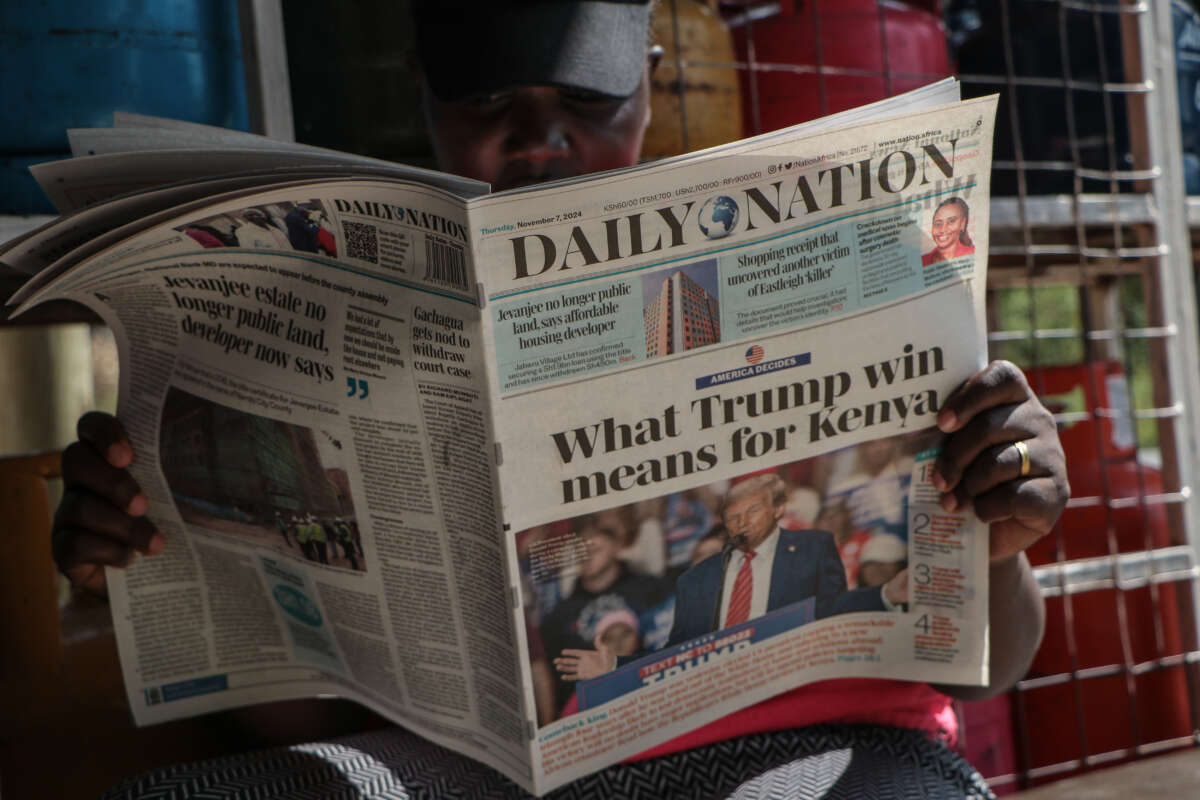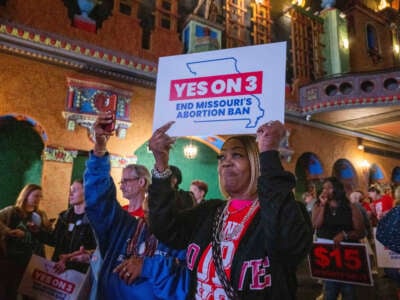Trump’s Victory Threatens Reproductive Rights Far Beyond US Borders
Trump has emboldened anti-abortion groups globally. African women and girls will suffer as a result.
Trump has emboldened anti-abortion groups globally. African women and girls will suffer as a result.
Op-Ed |
November 10, 2024

A Kenyan woman reads newspapers at a shop in Nakuru, Kenya, on November 7, 2024, following the U.S. presidential election.
James Wakibia / SOPA Images / LightRocket via Getty Images
Trump’s presidency already looks set to have a catastrophic effect on sexual reproductive health and rights on the African continent. I work as a reproductive and gender health specialist in Uganda and we’re still feeling the impacts of Trump’s last presidency. No doubt, African women and girls across the continent are worried about how Trump’s second presidency will impact their health and lives.
In his last term, we saw an emboldening of anti-rights, anti-gender and anti-democratic forces, while Christian right values were weaponised against minorities. And this spread well beyond its borders. With his latest election win, the groups that backed his bid to power will likely feel even more emboldened.
Trump’s administration attempted to create entirely alternative international human rights frameworks like the Geneva Consensus Declaration — which, contrary to its title, is neither a document arrived at through consensus nor does it have anything to do with Geneva. It was in fact developed and launched with the signatures of 34 countries, many of which are states with poor human rights records, including Uganda and Kenya. The GCD seeks to challenge the existence of an international right to abortion and the research and development progress that has happened in the last decade to make safe abortions accessible globally.
The policy has since emboldened states that have signed onto this harmful policy to clamp down on abortion access with increasing notoriety as the signatories of this policy now stand at 39, with Chad and Burundi being the latest entrants.
Trump also has connections with individuals like his long-time ally Viktor Orban, the prime Minister of Hungary, and Micheal Pompeo and Valerie Huber; the latter is one of the architects of the anti-women Geneva Consensus Declaration anti-women coalition.
Related Story
Trump’s presidency already looks set to have a catastrophic effect on sexual reproductive health and rights on the African continent. I work as a reproductive and gender health specialist in Uganda and we’re still feeling the impacts of Trump’s last presidency. No doubt, African women and girls across the continent are worried about how Trump’s second presidency will impact their health and lives.
In his last term, we saw an emboldening of anti-rights, anti-gender and anti-democratic forces, while Christian right values were weaponised against minorities. And this spread well beyond its borders. With his latest election win, the groups that backed his bid to power will likely feel even more emboldened.
Trump’s administration attempted to create entirely alternative international human rights frameworks like the Geneva Consensus Declaration — which, contrary to its title, is neither a document arrived at through consensus nor does it have anything to do with Geneva. It was in fact developed and launched with the signatures of 34 countries, many of which are states with poor human rights records, including Uganda and Kenya. The GCD seeks to challenge the existence of an international right to abortion and the research and development progress that has happened in the last decade to make safe abortions accessible globally.
The policy has since emboldened states that have signed onto this harmful policy to clamp down on abortion access with increasing notoriety as the signatories of this policy now stand at 39, with Chad and Burundi being the latest entrants.
Trump also has connections with individuals like his long-time ally Viktor Orban, the prime Minister of Hungary, and Micheal Pompeo and Valerie Huber; the latter is one of the architects of the anti-women Geneva Consensus Declaration anti-women coalition.
Related Story

7 States Just Enshrined Abortion Rights, as Possibility of a Federal Ban Looms
Many voters backed ballot measures to protect abortion, even as they elected a president who attacks abortion rights.
By Lauren Rankin , TruthoutNovember 8, 2024
These same actors have played a role in the development of Project 2025 — the 900-page conservative blueprint for the incoming republican presidency, produced by the right-wing Heritage Foundation and its coalition partners. Among other things, Project 2025 targets limiting access to the medical abortion drug, Mifepristone. It advises the reinstatement of 2017 expanded ‘global gag rule’, which prohibits foreign NGOs that receive any funding from the US from providing abortion services. Reproductive rights advocates have indicated that Project 2025 is poised to be the greatest threat of our times to reproductive health and rights.
In practice, this means that Africans can expect to see increased deaths and injuries from unsafe abortions and similar ripple laws and policies being implemented in their countries because of the populist agenda of their political leaders. We will see more women and girls dying or facing debilitating injuries from unsafe abortion because organisations that provide these services will have the resource taps turned off.
It is important to note that many of our social service budgets in Uganda and other sub-Saharan states are supplemented by foreign financial assistance. A US administration indifferent to the needs of the people of Africa, coupled with harmful policy reforms, will have a catastrophic impact. Ugandans depend on these actors for life-saving healthcare services, and they stand to suffer and even die if no mitigation measures are put in place.
Moreover, during his last presidency, Trump’s hand-picked justices, Brett Kavanaugh and Amy Coney Brett, overturned Roe v Wade. This further strengthened the anti-rights movement in Africa to fight any legal, policy, and service delivery programs aimed at expanding abortion access.
For instance, a high court in Kenya made a progressive judgement in March 2022 by relying on Roe v Wade’s definition of the right to privacy as an integral part of women’s rights. Since the landmark US case was repealed, it opened up avenues for the subsequent appeal of the progressive judgement by the Malindi High court.
Trump, of course, is also a climate change denialist, making the US the first country to pull out of the Paris Agreement in 2020. But climate-induced crises and rising temperatures have a disproportionate impact on not only Africans but also women’s health and lives. We as feminists on the continent, therefore, expect that his repressive policy stance on reproductive health and on climate change together will continue to perpetrate preventable deaths and injuries of women and girls and push them further into poverty.
We have no illusions that Kamala’s win would have been a silver bullet to all the gender and reproductive justice issues that remain contested in the US and globally. But we also know that many of Kamala’s proposed policies would have been beneficial for African women, girls, and other structurally marginalised groups. Her party was clear about the fundamental nature of the right to bodily autonomy and equality before the law, in stark contrast to the incoming president.
Ultimately, Trump’s win makes our work harder as feminists because we have a far-right-leaning president and the state’s resources and structures that, under his unchecked control, will be weaponised against minorities in the US and beyond. After all, as we have seen, US far-right spending is already booming in Africa.
As advocates, we need to return to the drawing board, take stock of the resources, including our existing global and national allies, and deploy these strategically. We also have to hold the line on hard-won wins; we must not grow silent but continue to check the disinformation that anti-rights groups usually deploy, and most importantly, we must tap into our collective strength and stand in solidarity with all feminists and pro-human rights activists, whether in the US, Latin America or Africa, and continue to chip away at systems of destruction like patriarchy, misogyny, fascism, imperialism with perseverance and care of self and community.
Joy Asasira
Joy is an advocate and strategist for gender justice working predominantly in Uganda and Kenya, with an Africa-wide footprint. She is particularly interested in feminism, advocacy, strategic communications, movement building, legal and policy analysis and reform, and organizational development. For 10 years, she has coordinated Uganda’s National Coalition to Stop Maternal Mortality due to Unsafe Abortion. She was also a program manager at the Center for Health Human Rights and Development, CEHURD. In 2019 she won the best female human rights lawyer award from the Uganda Law Society.
No comments:
Post a Comment